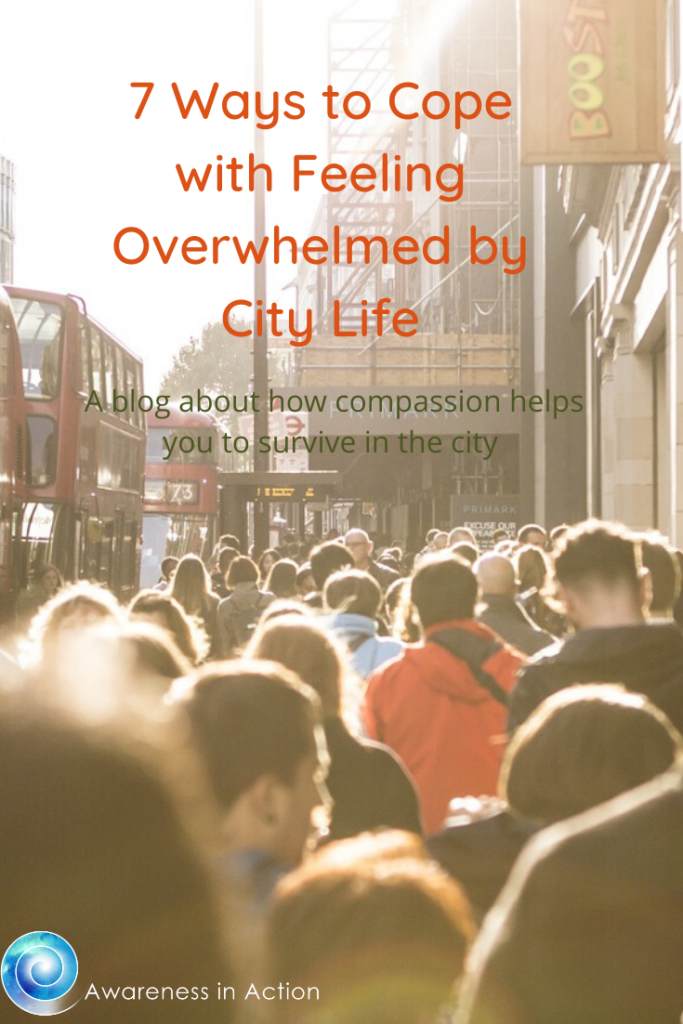We have all been there. Those moments when city life feels too full—too many people, too much noise, too much everything. We long for some peace and quiet and a chance to regroup.
For most of us the immediate answer is not a holiday. We have families to care for, and bills to pay. That means we need to be able to work with our feelings of being overwhelmed by the city from within ourselves—to find inner space even when there does not seem to be any on offer.
When we feel overwhelmed it’s easy to withdraw, to close in on ourselves and try to put up a wall. This tends to solidify our feelings and cut us off from managing our feelings. To cope with feeling overwhelmed in the city in the long term, we need to be more daring.
Here’s some things we can try.
1. Take a moment
Think about how you begin your day. You jump out of bed to get started on the list of things that need to be done—get ready for work, hurry the kids up for school. You rush into the shower but instead of being present in the running water and enjoying the moment, you are thinking of that conversation you had with your boss the day before or worrying about getting your son to the dentist after school.
Research carried out at Harvard University in 2010 showed that for almost half of our waking hours we are thinking about something different from what we are doing. In other words, we are not fully present for many of our actions. This means that we are neither bringing our full resources, or, appreciating the moment we are experiencing. As life is uncertain, the only moment we can be sure of is the present moment—so it is ironic that we so frequently miss it.
On top of that, we plan our days with lists of things that need to be done and then assess ourselves on how far we have accomplished them. We rarely take a moment to simply allow ourselves to be. Often, we neglect the importance of simply being in order to put all our attention into doing.
Try to break up your day by taking short moments to nourish yourself. City life offers many good times to do this are when you are on tram, or bus, waiting in the queue at the supermarket, or changing from one activity to another.
- Pause in what you are doing
- Bring your attention to your body
- How do you feel?
- What is your mood?
- Take a few slow, deep breaths
- Feel the richness of the moment you are living right now
- Continue with what you were doing
2. Stay open and curious
City life offers many opportunities to be open and curious. When you are going about your day you pass all kinds of people, lots of different activities and situations. Perhaps there are buskers in the metro, maybe you see a mother struggling to get her small children on to a tram or a bunch of visiting students laughing and excited about their visit to your city.
Cities are usually vibrant places with lots of energy. When we are tired or stressed it can be hard to go with the flow. We want to shut ourselves off from the noise and bustle. Instead, if we are being present, we can simply see what is happening around us. It’s not necessary to get into all kinds of opinions and judgements—we can just notice. We can stay open to new experiences, to new ideas and let them unfold around us without resisting. That way the activity can nourish and engage us, instead of exhausting us.
- Try taking the time to look about you.
- Look up, rather than looking down at the sidewalk.
- Notice the changes that happen with the seasons.
- Be curious about anything different that you see.
- Look out for what intrigues you.
- Allow yourself to connect instead of withdrawing.
3. Be patient
Do you remember when you were a child being told, ‘Patience is a virtue’? It sounded really boring, didn’t it? Certainly, not a way to get what you want and to cut through the crowd. It took me a long time to appreciate the value of patience and to recognise the extent to which it eases stress.
There are so many moments in an average day in a city life where impatience can flare up—standing in line in a shop, waiting your turn in a café only to have someone barge in ahead of you. When everyone is in a hurry there are so many moments where people can act thoughtlessly—walking in big groups on the sidewalk, pushing you out of their way to get past. An angry reaction can rear up even when we are in a good mood—if we are tired, or worried it happens even easier.
The thing is, going with our impatience is exhausting and the emotions that impatience stirs up, such as anger and resentment, are not good for us. They increase our stress levels and can lead to higher blood pressure and heart problems. Positive emotions like kindness and tolerance, on the other hand, do promote wellbeing.
Being able to respond to challenging situations with patience is not a passive activity. It requires self-awareness and a capacity for seeing things from other people’s point of view. It involves flexibility and a degree of openness.
Next time your patience is challenged:
- Try taking a moment to come home to yourself
- Open up your awareness to view the whole situation you are in
- Be aware of the needs of other people around you
- Don’t focus exclusively on your own agenda
- Engage your sense of humour
4. Do something for someone else
A couple of weeks ago I was on my way home and feeling pretty tired. It was a relief when the tram showed up. As it happened, I had a lot on my mind. A work project I was working on was taking much longer to compete than I had anticipated, and it was causing me concern. Out of the corner of my eye I noticed a young mother with two small children—a toddler and a baby. I didn’t pay so much attention because of the problem I was working with in my mind.
It turned out that we got off at the same stop and the mother had all the struggle of collecting her buggy and getting the baby into it. As they moved off, I noticed that one of the children had dropped a soft toy on the pavement. Everybody was too busy to see. Luckily, I could pick it up and return it before it got trampled. The toddler say the toy and grabbed for it joyfully—it must have been a favourite—and the mother gave me a grateful smile.
In those short moments, my mood changed completely. I went from being self-focused and worried to feeling a great sense of wellbeing. Taking a moment to help someone else lightened my mood and helped me to feel less oppressed by my own concerns.
5. Smile
It’s all too easy as you go through an average day in your city life to put your head down and carry on. We are busy and we want to get on with what we have to do.
Even if we don’t see an opportunity to do something for someone else, we can at least smile. There is more to smiling than we think. It helps us to feel more open and accessible and it is pleasant for other people too.
6. Be grateful
Research is showing that people who make gratitude an active part of their lives are happier. It’s relatively easy to feel grateful for big things like promotion or moving to a new house but it’s harder to feel grateful on a daily basis.
If we look around and pay attention there is plenty that we can find to be grateful for in city life. Noticing the richness that we have in our lives is nourishing and will help us to feel stronger and more able to cope.
Here’s some ideas:
- Before you go to sleep think of something that happened in your day that you feel grateful for
- Keep a gratitude journal
- Have a gratitude jar in the kitchen where everyone can contribute
- Hold a gratitude session once a week with your family, where each person shares something that they were grateful for during the week.
7. Remember common humanity
It helps to remember that all the people in your street, in your neighbourhood, in your city want to be happy and they don’t want pain. It’s a fact of life. Maybe some people have strange ways of trying to be happy, but they still do. The longing for happiness is part of being human. Yet we all know that life can be hard and difficult times come for all of us. When city life seems too much to handle, remember to see all the people as a collection of individuals—who will have a lot in common with you on a fundamental human level.
Here’s a simple exercise you could try.
- Pay attention to the people you pass in the street
- Notice if you make a comment in your mind about someone
- Be aware of the people you feel drawn towards and the ones you do not like the look of
- Try to imagine how they might see you as you pass them by
- Take a moment to be aware that everyone you see wants their day to go well and to avoid any unpleasantness
—just as you do - Then realize that inevitably for some people things will go wrong during the day
—let that feeling touch you and help you to feel a common humanity with your fellow travellers.

You might be interested in this new zoom+online course which starts on 15 June 2021 HOW DO YOU WANT TO FLOURISH IN YOUR RIPE OLD AGE?
Awareness in Action is dedicated to building a community of people interested in living a life of meaning and purpose based on sustainable wellbeing. If you would like to join with us, you could make a start by sharing and commenting on the ideas you find in the blogs on these pages. Your story is part of our journey.



This is a very well written article. We all have our daily struggles and a little humanity can go a long way. Thanks for spreading this awareness.
Thank you for reading!